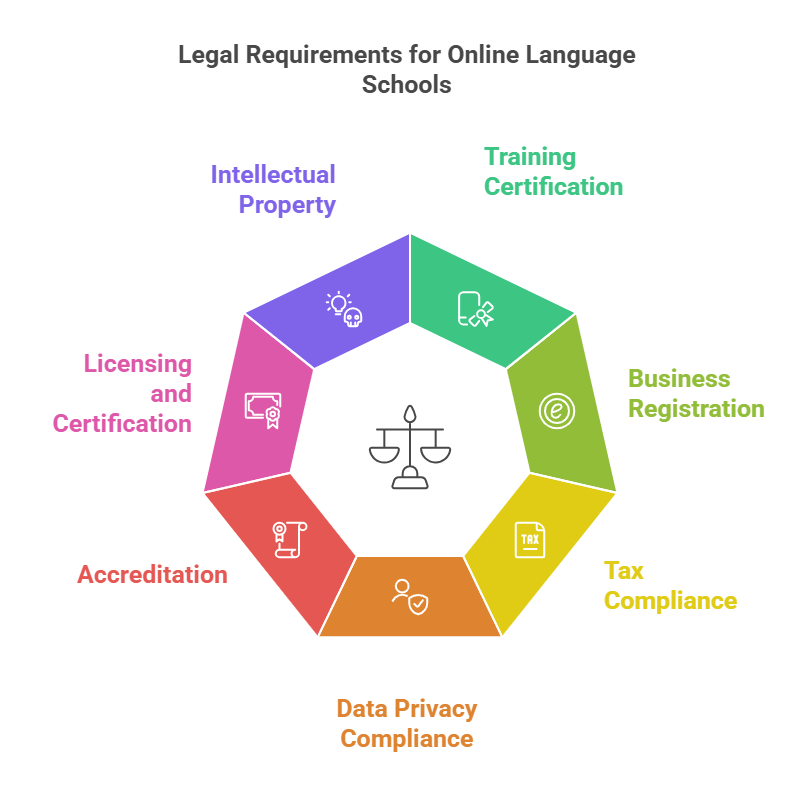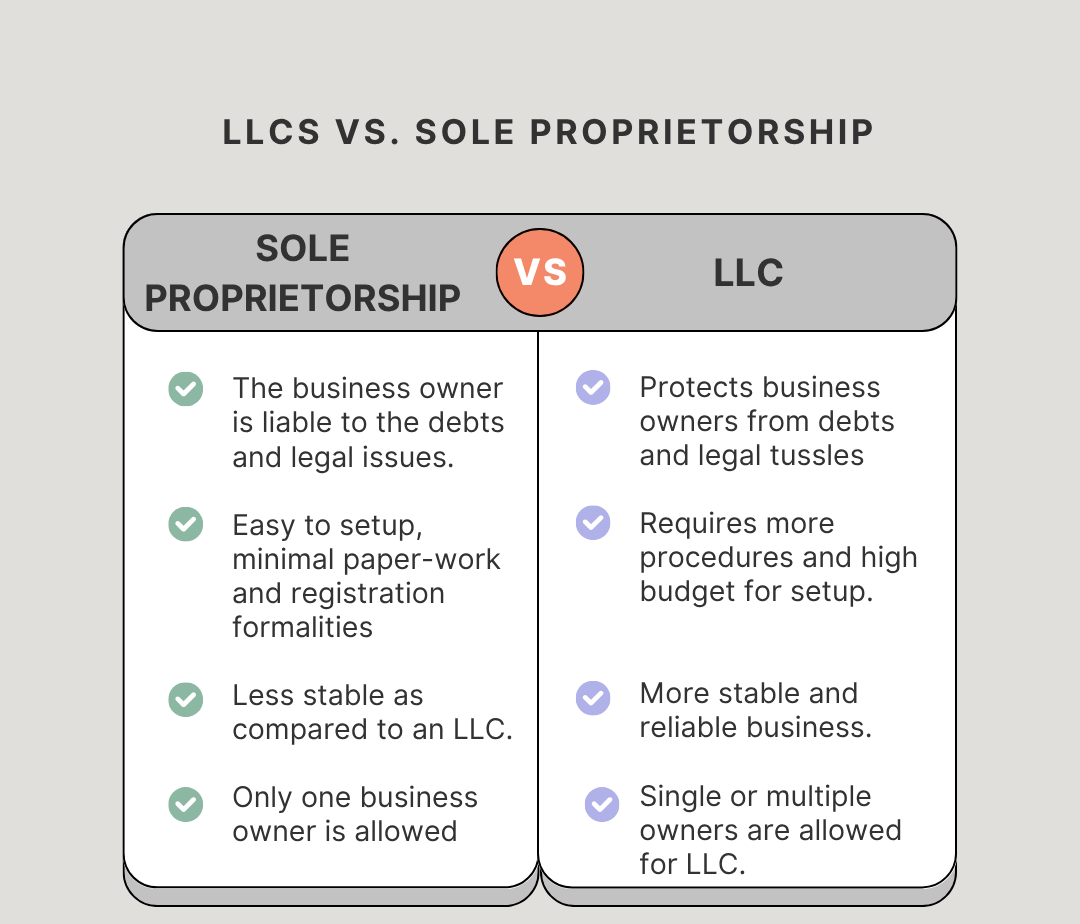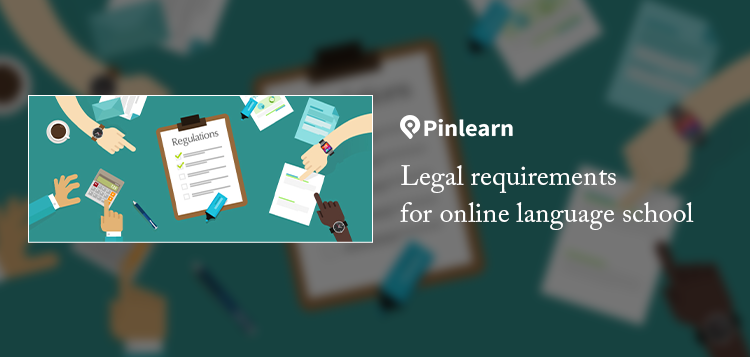Legal Requirements to Start an Online Language School
Planning to start an online language school? One of the biggest stumbling blocks entrepreneurs face is legal requirements. Navigating the legal maze is complex!
Laws & regulations are often confusing and complex to grasp. Avoiding them is not an option either. So, what’s the solution? A proactive approach to understanding the regulations and laws that matter.
This article takes a closer look at the essential legal requirements for starting an online language school. So, consider these points to legally secure your online language school!
Why Consider Legal Requirements for Online Language School?
First, let’s explore why navigating the legal landscape is essential:
-
Avoiding Penalties and Lawsuits
Whether it’s local permits or licenses, non-compliance leads to hefty penalties. Non-compliance with data privacy laws, copyright infringement, and even data breaches can lead to lawsuits.
-
Building Trust and Credibility
Accreditations and certifications elevate your online school’s brand authority. This implies your school meets the teaching and curriculum standards. So, people are likely to trust without second thoughts.
-
Compliance with Data Privacy
With the rising significance of privacy laws, regulatory compliance is uncompromisable. The primary goal of laws like FERPA and GDPR is to inform users on how data is collected, stored, and utilized.
-
Protecting Against Copyright Infringement
While curating curriculum, ensure you have the right to use educational materials or videos. This protects you from infringement issues and legal issues.
What are the Key Legal Requirements for Online Language School?
Navigating the legal landscape for starting an online school is challenging. And they are unique to different countries and regions.

1. Training Certification & Experience
First, assess whether you have the necessary teaching qualifications & certifications. For example, for starting an English school, a TEFL certificate shows credibility. Likewise, an ELE certificate demonstrates your proficiency in Spanish.
So, you should look for certifications and accreditation equivalents in your language.
Additionally, getting a teaching license or a bachelor’s /master’s degree in education or a related field is recommended.
If you have assistant teachers in your language school, ensure they fulfil minimum requirements. Verify their education and employment history before making a hiring decision.
2. Business Registration
One of the key legal requirements is to register your language school. Although everything is virtual, you can’t skip the registration process.
Obtain the necessary permits and licenses for running your language school.
Here’s what the registration involves:
-
Choosing business structure
Language schools fall under the scope of educational or training activity. So, you can choose to run it as a sole proprietorship, civil partnership, limited liability, or other forms. Typically, sole proprietorships or LLCs are recommended for online schools.

-
Choosing a Name
While you might wonder, “What’s in the name?” Choosing a simple and catchy name strikes a chord with your audience.
Keep it creative. Try wordplay – like using funny, clever names. e.g.,” HappyEnglish” or “The English Hub.”
3. Tax-Compliance
Tax-compliance is one of the key legal requirements for online language school.
If you’re running an online language school, you’re subjected to self-employment taxes. However, the tax implications depend on your business structure.
In case of sole proprietorship, income is reported under personal tax return. While LLCs are “pass-through-entities”, unless they opt to be taxed as corporations.
Language school needs to register for an EIN(Employer Identification Number) and sales tax ID. But, whether sales tax is applicable or not depends on your location.
US-based language schools need to pay sales tax, if they sell videos, courses or ebooks. On the other hand, VAT is applicable for EU-based schools.
4. Compliance with Data Privacy Laws
Your language school collects personal data from learners and staff. This may include personal and confidential information, such as payment details.
So, you must comply with privacy laws specific to your region. For example, GDPR for the EU and FERPA to protect the integrity of US students. It requires their consent before collecting personal data.
As per the Family Educational Rights and Privacy Act (FERPA), parents have access to the child’s educational records until they are 18 or when they become an “eligible student.”
- Transparency – Inform users on the data collected, purpose, and how it will be used.
- Consent – Explicit user consent is essential before collecting personal data is crucial.
- Security Measures – Implement adequate security measures like 2-factor authentication, data encryption, SSL certificates, SSO, etc.
- Data Subject Rights – Learners have the right to erase, modify, and portability requests. This ensures maximum control over personal data and usage.
- Purpose Limitation – Data collected should be used for the legitimate purposes for what it was collected.
- Privacy policy – Include a transparent privacy and GDPR policy in your online school. The policy should state how data is collected, stored, and shared.
- Essential audits and reviews – Conduct regular audits to identify & address potential vulnerabilities.
5. Accreditation
Many schools and employers only recognize degrees from accredited institutes. Moreover, accreditation is compulsory for language schools at specific places.
If you want your language school to be credible, then accreditation is essential.
These are top accreditation agencies:
- Evaluation & Accreditation of Quality Language Services (EAQUALS)
- International Association of Language Centre(IALC)
- Commission for English Language Program Accreditation (CEA)(U.S.)
- Accreditation Council for Continuing Education and Training (ACCET) (U.S.)
- SEVP Certification (for enrolling international students)
Steps to get accredited:
- Choose your accreditation body – Select a well-recognized body, depending on your niche.
- Check the accreditation requirements– Find the teaching qualification, curriculum, and business practices.
- Prepare your documentation– Show your financial stability, well-structured business, instructor qualifications, etc.
- Submit the application – Gather all the documents and ensure you’re confident you meet the requirements. Go ahead and hit “Submit.”
- Expect a virtual audit – The concerned authorities will assess your school for eligibility. If you meet their requirements, you’ll get an approval certificate. At times, you’ll be notified of a list of necessary changes.
6. Licensing and Certification
You need the necessary licenses and permits for the smooth functioning of your online school. Ensure you check the state permits and licenses necessary for operating your online school.
This minimizes the liability and risk involved in your business. Avoid cutting corners in this aspect. Some jurisdictions require online schools to have licenses and certifications. Check with the state’s Department of Education and local authorities for requirements before starting.
Additionally, you can get insurance for your school. This includes general business insurance, cyber liability and professional liability insurance.
7. Intellectual Property
Online language schools should adhere to the IP law to protect branding, learning resources, etc. So, you need a license to protect your resources from misuse or theft.
Key areas under IP protection:
- Register trademark to preserve your school logo, brand name, etc
- Copyright on learning resources like lessons, video recordings, and text
- Protecting your trade secrets, business practices, etc
- Clear contracts with instructors and other collaborators or IP usage rights
In case you are reproducing content from other publishers or creators, you need to get their license as well.
Conclusion
Starting an online language school is an excellent way to step into the educational industry.
However, navigating the complex legal landscape requires expertise. As the regulations are subject to change as per state and region-specific laws.
We have covered the key legal requirements for online language school. Lastly, stay updated about the changes in your local and state regulations and laws.
So, good luck starting your online language school!
🏫 Related Blogs:
FAQ-Related to Legal Requirements for Online Language School
1. Is it essential to get a license to teach English online?
You don’t need a license to teach English online. However, a TEFL/TESOL certificate demonstrates your teaching expertise and credibility. It also increases your chances of getting hired and even a competitive edge.
2. What are the federal requirements for ELLs?
There are several supreme and federal laws related to English language learners. The primary goal is to maintain equal access to education.
Here are the key requirements of these federal laws:
- Identify and assess who needs language assistance.
- Schools must provide language assistance programs to ELL learners.
- Ensure equal opportunity and participation in all curricular and extra-curricular activities. This includes standard curriculum, advanced courses, sports and clubs.
- The needs of ELLs with disabilities must be considered during content delivery
- Monitor and evaluate the progress of language assistance programs.
3. What do I need to open an English school?
To start an online English school, you need the following requirements:
- Teaching qualifications, such as TEFL certification or a bachelor’s degree.
- Research your target market
- Outline a business plan
- Legal and operational requirements
- Design a curriculum
- Create a solid brand presence
- Scale your language school business
4. What are the key legal requirements for starting an online language school?
These are the essential legal requirements for online language school:
- Teaching qualifications & certifications
- Business registration
- Licenses & permits
- Tax-compliance regulations
- Accreditation
- Compliance with data privacy laws like GDPR, FERPA
- Intellectual Property Laws





